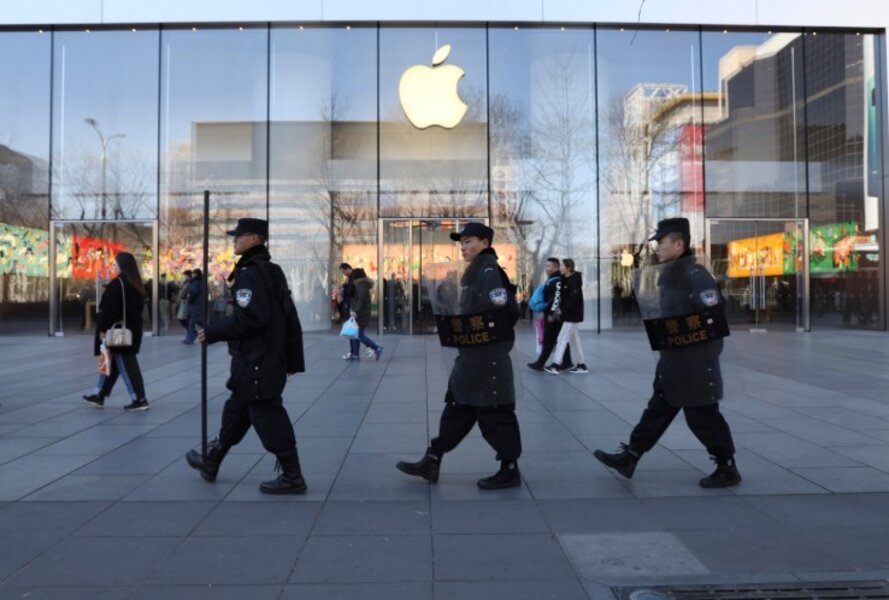Why virus travel bans can undermine the global economy
Loading...
| Beijing and Milwaukee, Wisconsin
Travel restrictions and business closures aimed at stopping the spread of a new virus that originated in China could end up causing ripple effects that harm the global economy, experts say.
“When you stop planes and ships, trains and and motor vehicles from moving, it starts to shut down the economy – and that can have a cascading effect throughout society,” Dr. Eric Toner, senior scholar at the Johns Hopkins Center for Health Security, said Saturday, after multiple airlines announced that they would suspend or cut back on flights to and from China, and several countries, including the U.S., imposed travel restrictions. “And it's not just airline pilots who get out of work, I mean, it's you know, it's everybody that they depend on.”
The Shanghai Composite index tumbled nearly 8% on Monday as Chinese regulators moved to stabilize markets. Chinese officials say that they will pump 150 billion yuan ($22 billion) into its economy on Monday to help protect it from the affects of the coronavirus outbreak. China's central bank said Sunday the move would ensure there was enough liquidity in the banking system and help provide a stable currency market, reported Reuters.
On Wall Street on Friday, the Dow Jones Industrial Average skidded more than 600 points (2.2 percent). The U.S. market, which had calmly been setting record after record, suffered its worst January since 2016 and its first monthly loss since August.
It's not just airlines that have cut back on business in China. Apple Inc. announced Saturday that it would temporarily close all of its offices and its 42 stores in mainland China. Google, Amazon and Microsoft previously announced plans to temporarily shutter offices, and Starbucks and McDonald's have closed some chains.
Apple said it was acting “out of an abundance of caution and based on the latest advice from leading health experts." Its stores will be closed until Feb. 9.
Mr. Toner said Apple's decision could also be harmful to the economy and Apple itself, though he noted that many companies, including airlines, are trying to protect their employees.
Mr. Toner led a summit in October with World Economic Forum and the Bill and Melinda Gates Foundation to discuss the negative impacts of trade and travel restrictions during a pandemic. In a paper that came out of that meeting, the Johns Hopkins Center for Health Security concluded that “fear and uncertainty experienced during past outbreaks, even those limited to a national or regional level, have sometimes led to unjustified border measures."
The U.S., Australia, Singapore and Japan have imposed travel restrictions, and Vietnam suspended all flights to China. U.S. officials pointed to how quickly the virus has spread around the globe as justification, although world health officials have warned against such measures.
At least 24 countries have reported cases of the new virus, which is from the coronavirus family.
“Travel restrictions can cause more harm than good by hindering info-sharing, medical supply chains and harming economies,” World Health Organization Secretary-General Tedros Adhanom Ghebreyesus said.
Mr. Toner said governments are ultimately "trying to do something that has very little benefit but very real harm.”
“It's been shown over and over again that putting up barriers to travel doesn't stop contagious infectious diseases,” he said, pointing to past outbreaks of Ebola, Zika and even influenza.
Instead, he said, governments should educate people about the virus and urge people who may have been exposed to isolate themselves.
The first death outside China from the new coronavirus was recorded Sunday in the Philippines, as countries around the world evacuated hundreds of their citizens from the infection zone and Chinese authorities completed a new, rapidly constructed 1,000-bed hospital for victims of the outbreak.
The trading and manufacturing center of Wenzhou, China, with nearly 10 million people in coastal Zhejiang province, confined people to their homes, allowing only one family member to venture out every other day to buy necessary supplies. Huanggang, home to 7 million people, imposed similar measures on Saturday. Chinese authorities also delayed the reopening of schools in the hardest-hit province.
Philippine President Rodrigo Duterte approved a ban on the entry of all non-citizens from China, despite criticism from China and an assessment from the World Health Organization that such measures were unnecessarily hurting trade and travel.
The death toll in China climbed to 361 on Monday, and the number of cases worldwide surged past 17,000, according to China's National Health Commission and other nations. The vast majority of those infected are in China; about 150 cases have been reported in two dozen other countries. The U.S. has recorded eight cases.
Despite its own drastic travel restrictions, China has chafed at those imposed by foreign governments, criticizing Washington’s order barring entry to most non-citizens who visited China in the past two weeks. Apart from damaging China's international reputation, such steps could worsen a domestic economy already growing at its lowest rate in decades.
Over the weekend, South Korea and India flew hundreds of their citizens out of Wuhan. A Turkish military transport plane carrying 42 people arrived in Ankara on Saturday night. A French-chartered plane made its way toward France on Sunday with 300 evacuees from a multitude of European and African countries. And Morocco flew home 167 of its people, mostly students.
Indonesia flew back 241 citizens from Wuhan on Sunday and quarantined them on the remote Natuna Islands for two weeks. Several hundred residents protested the move.
The Trump administration's national security adviser, Robert O’Brien, said on CBS’ “Face the Nation” that the Chinese so far “have been more transparent certainly than in past crises and we appreciate that and we continue to offer assistance to the Chinese.”
“Right now, there’s no reason for Americans to panic,” he added. "This is something that is a low risk we think in the U.S.’’
This story was reported by The Associated Press.







